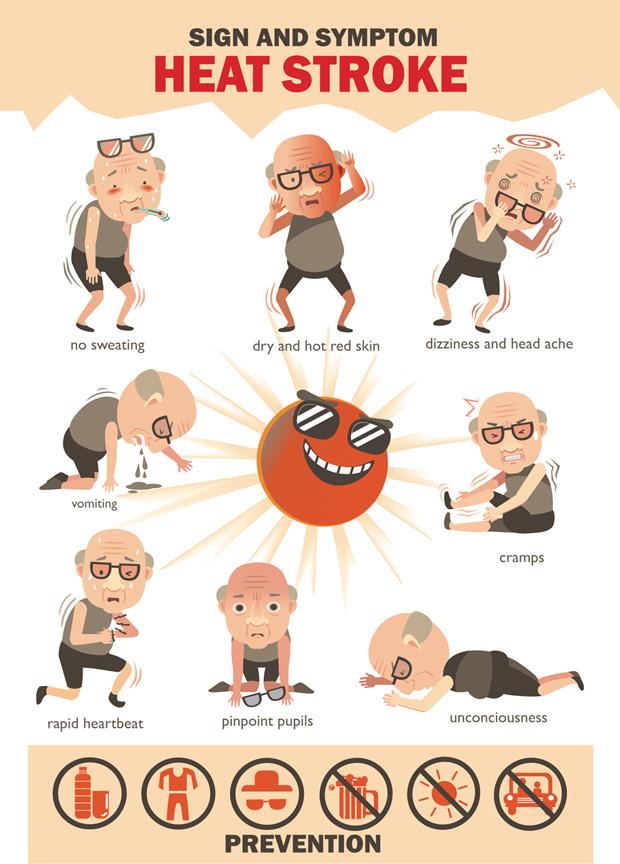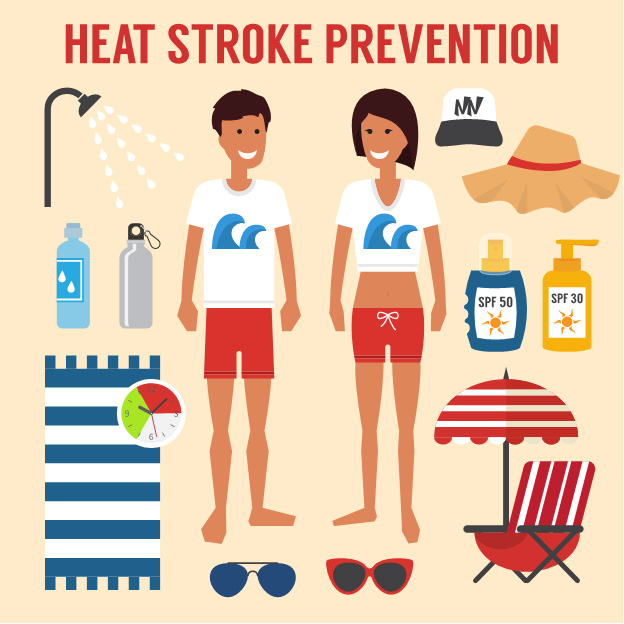
What Are the Warning Signs You Could Have Heat Stroke?
Thursday, December 10, 2020
Aussie summers can reach sweltering temperatures that make it dangerous to spend too much time outside without the proper protection. “Slip, slop, slap” comes to mind as we prepare our families for the intense sunshine and extreme heat.
One of the dangers of rising temperatures is heat stroke but how do you know you're about to experience one? Here, we're talking about heat stroke, the symptoms and warning signs, as well as prevention and treatment measures you can take for heat stoke.
What is heat stroke?
Also sometimes known as sun stroke, heat stroke is a dangerous form of hyperthermia where your body temperature increases rapidly to a level of 40 C degrees (or 106 F). It is accompanied by changes in your nervous system and is an extremely dangerous medical condition that can often be fatal if left untreated.
What causes heat stroke?
Our metabolism naturally creates heat in our bodies, but heat stroke occurs when the body is unable to naturally cool down its internal temperature through sweat. I can happen when the outside heat is too overwhelming or we overexert ourselves.
It can also be caused by dehydration since your body doesn't have the resources it needs to sweat and therefore dissipate its internal heat. Excess alcohol use and overdressing can also lead to heat stroke.
Exertional heat stroke is the term that describes heat stroke that occurs when we're overactive in hot weather. Non-exertional heat stroke is heat stroke that occurs from extremes in climate or from internal disorders that could affect young, old, or ill people.
When you're experiencing heat stroke, it is a medical emergency but it is not the same thing as a stroke. A stroke is a generalised term meaning a lack of oxygen to the brain. Yes - the language is confusing, but they are two very different issues.
Certain People Are More at Risk for Heat Stroke
People who are most susceptible to heat stroke are athletes, infants, the elderly, people who are chronically ill or obese, and outdoor workers. Certain drugs can also cause your body to experience heat exhaustion which could lead to heat stroke.
Infants and elderly people have less of an ability to regulate their body temperature naturally. For infants, perhaps those systems haven't fully developed and for the elderly, the may have a disease that affects their self-regulation or take medications that can contribute to heat stroke.
That's right - certain drugs may inhibit your body's ability to stay hydrated which poses an added risk of heat stroke. These types of drugs include those for high blood pressure, cardiac problems, antihistamines for hay fever, sleeping pills, and some psychiatric drugs.
Obesity is another factor that could lead to heat stroke since carrying excess weight can affect your body's ability to self-regulate and cause your body to trap heat.
Heat Exhaustion vs. Heat Stroke
There are three types of heat-related syndromes ranging from mild to severe: heat cramps, heat exhaustion, and heat stroke, in that order.
Heat exhaustion can develop suddenly or over time and some of its warning signs include:
- Nausea
- Vomiting
- Cool, moist skin with goosebumps even while out in the heat
- Heavy sweating
- Fatigue
- Weakness
- Headache
- Feeling faint or dizzy
- Weak, but rapid pulse
- Muscle cramps and aches
- Low blood pressure upon standing
If you're concerned that you're experiencing heat exhaustion you should immediately stop what you're doing and rest, move to somewhere cooler and drink cool water or electrolyte drinks.
Usually, heat exhaustion can lead to heat stroke so if you're exhibiting signs of heat exhaustion, it's important that you take care of it as soon as possible.
Heat Stroke Symptoms
Some people say that experiencing heat stroke can feel like you're having a heart attack. The symptoms of heat stroke include:
- An extremely high body temperature
- Confusion
- Irritability
- Disorientation and hallucianations
- No sweating; Instead your skin will be red or dry and flushed.
- Difficulty breathing
- Seizures
- Coma
Heat strokes are extremely dangerous and can be fatal, so it's imperative that people experiencing these symptoms seek emergency medical help immediately.

Heat Stroke Treatment
Before we talk about how to treat heat stroke, let's begin by explaining some preventative measures.
Some of the best ways to prevent heat stroke are to:
- Avoid dehydration by drinking plenty of water and electrolyte drinks
- Avoid doing rigorous activities outdoors in hot, humid weather especially during the hottest parts of the day
- If you're required to work outdoors, take measures to acclimate to the heat
- Do not leave children or pets in cars, even in moderate weather conditions
- Take extra precautions when the outdoor heat index is above 33 C (91 F)
- Wear light, loose-fitting clothing
- Wear suncream
- Wear a wide-brimmed hat
- Take extra precaution when taking certain medications

Heat exhaustion is usually apparent to medical professionals, but if they're not sure if your heat exhaustion has become heat stroke they might do x-rays, blood tests, urine tests, and muscle function tests to diagnose heat stroke.
Once heat stroke has been diagnosed, professionals will do what you might expect to treat it such as allowing you to rest in a cool place while drinking cool water, and loosening clothing. If symptoms don't improve, you might be immersed in cold water, wrapped in an ice blanket, or given medication to stop shivering.
As always, prevention is best and especially during our hot Aussie summers, it's important to be vigilant about preventing heat exhaustion and heat stroke.
At Physio Inq, we can help with some techniques to prevent heat stroke. Especially if you're struggling with excess weight, it's important that you learn some tools to lose weight and prevent your body from overheating.
Our exercise physiologists are trained in all the latest and most effective exercise treatments to help people lose excess weight and maintain healthy body composition. Give us a call today or book your first appointment online with an exercise physiologist at Physio Inq. Let's have a safe summer, free from the worry of heat stroke!
This article was originally written by Jonathan Moody from Physio Inq

